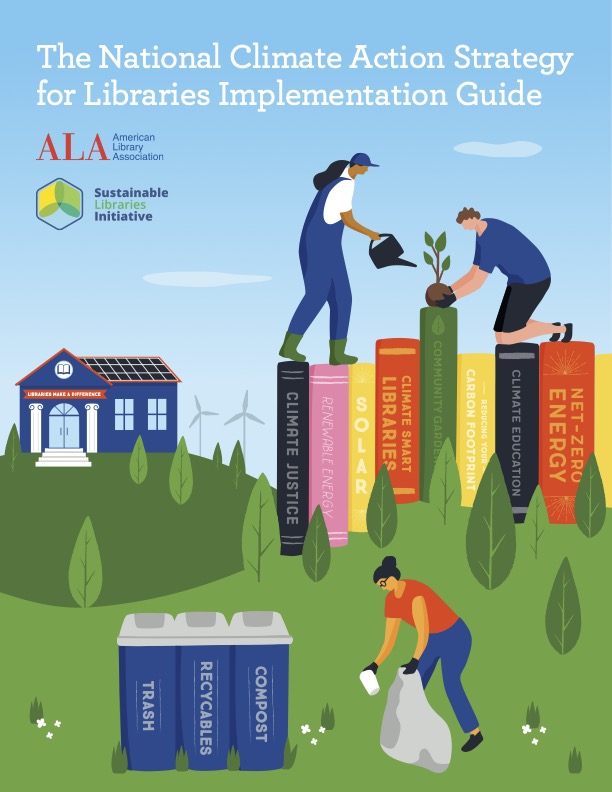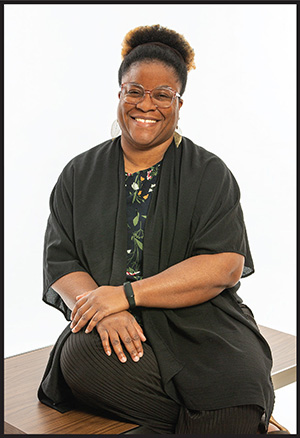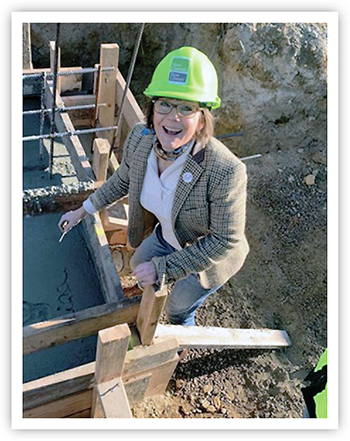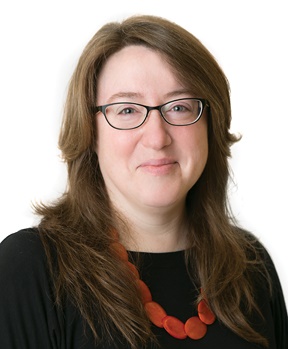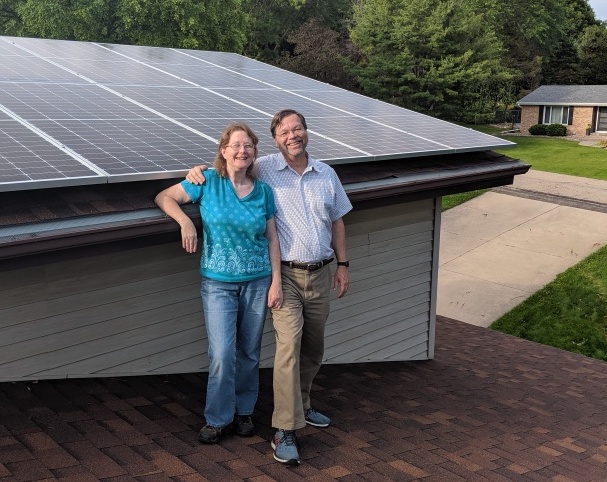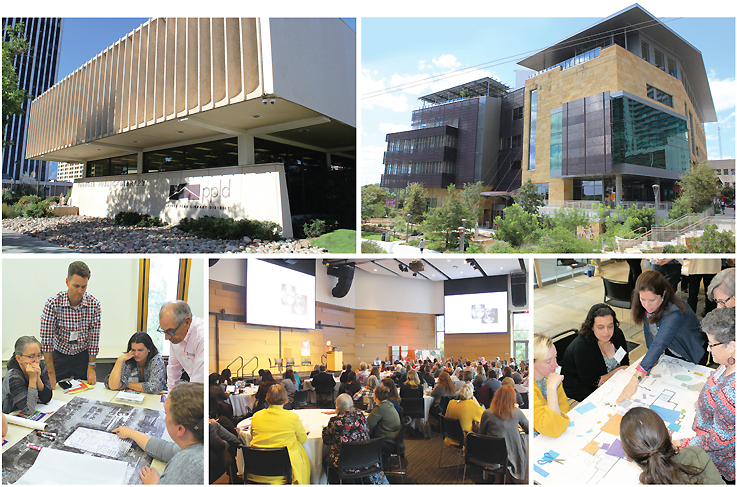Related
The American Library Association and the Sustainable Libraries Initiative have announced the new National Climate Action Strategy for Libraries and created an implementation guide to help libraries incorporate climate action locally into strategic and facility plans.
As the adult services librarian at the Curtis Memorial Library (CML) in Brunswick, ME, Hazel Onsrud is a passionate advocate for sustainable living, developing programming focused on sustainability to help her community discover how best to improve their environmental impacts.
Thanks to Nardia Cumberbatch’s leadership, Valencia College in Orlando, FL, was the first library in Florida (and second academic library overall) to complete the Sustainable Library Certification Program.
UPDATE: The ALA-SLI National Climate Action Strategy Working Group will hold an open forum to introduce a draft Climate Action Strategy for Libraries to ALA members, and to solicit feedback from the field, on Thursday, March 14. All library workers and trustees are invited.
The American Library Association and the Sustainable Libraries Initiative have teamed up to create a National Climate Action Strategy for Libraries to be released later this year. Both organizations have been working to raise awareness in the profession for the need to act with urgency to create communities of practice that can help library workers understand the issue and that can provide the practical approaches to manage the predicted impacts and systemic nature of climate change.
Public and academic libraries should be leaders in moving away from fossil fuels, prioritizing investments in net-zero energy construction, renewable energy, and electric vehicles. This requires commitment from leadership in facility and budget planning. Library administration and governing boards of trustees need to step up to prioritize greenhouse gas emission reduction in their strategic and operational planning.
The New Canaan Library, CT, is leading the way to address human rights in the building product supply chain.
On Earth Day 2022, Suffolk County, NY, Executive Steven Bellone announced a $12 million investment in electric vehicle charging stations. He chose the Lindenhurst Memorial Library—the second library in the country to be certified under the Sustainable Libraries Initiative’s Sustainable Library Certification Program—as the location for the press conference.
There is no more time to waste. Climate action is needed NOW. Libraries should be visible leaders and partner in this effort not only to protect the assets the public has entrusted them with but also to ensure library workers and community members have the support they need, through libraries, in the face of disruption.
As we think through the lessons we have learned over the past four years, one thing is quite clear: the way “we’ve always done things” is not sustainable for the well-being of our communities. We need to seek out those patterns that are emerging to systemically change the policy landscape of our society, economy and the environment and respect that leadership may look different in the coming years.
There is a threadrunning through almost all major headlines in our country this year: racial injustice.
The massive change in life circumstances over the weeks since my last column have been strange, terrible, and beautiful—often all at once.
Earth Day may find people wondering what they can do to help combat climate change and support sustainability efforts—particularly when most are still staying home to help slow the spread of COVID-19. But effective strategies can come from small starts. As GoFundMe, Indiegogo, and Facebook fundraisers have shown us, giving is not only for the rich—and philanthropy can come from unexpected places.
Unprecedented. Heartbreaking. Heartwarming. These three words have been most prominent in my mind as I observed and consulted with my colleagues, near and far, as they make tough decisions about how to keep their communities and staff healthy in the face of the COVID-19 pandemic.
At LJ’s 2019 Design Institutes in Colorado Springs, CO, held at the Pikes Peak Library District (PPLD) on September 13, four public libraries in California, Idaho, Texas, and Arizona enlisted architects and attendees to brainstorm on upcoming library design challenges.
As the year turns, so come the trends discussions and lists. There are certainly many that impact the people libraries serve, directly and indirectly. As I was starting to make my own list, Oxford announced its 2019 word of the year, “climate emergency,” defined as “a situation in which urgent action is required to reduce or halt climate change and avoid potentially irreversible environmental damage resulting from it.”
Hendrick Hudson Free Library in Montrose, Lindenhurst Memorial Library, and Saratoga Springs Public Library this year became the first libraries to complete the New York Library Association's Sustainable Libraries Certification Program, demonstrating their commitment to environmental stewardship, economic feasibility, and social equity.
Three hundred thirty-eight days. That’s the length of time between August 2018, when we first saw the news coverage of Greta Thunberg, a young climate activist in Sweden who started striking in front of Stockholm's parliament every Friday to demand climate action from her country’s leaders, and September 20, 2019, when global Climate Strike Marches brought an estimated four million young people and their supporters onto our streets to demand meaningful action from adults on climate change.
When you think about climate change, what do you feel? I asked my daughter, Harper, who is ten, that question last month. The exercise was part of a talk at a Drawdown Learn event held at the Omega Center for Sustainable Living. Despite how often we discuss the climate, this was the first time I had actually asked her that. Her answer was not surprising, but it was painful to hear. “I get this bad feeling in my gut,” she said.
Sustainability is no longer to be relegated to the “green team” (as awesome as they can be!). It is no longer a once-a-year theme we address in April or on Earth Day. This topic is, or should be, front-and-center in how we think about everything we do.
On April 4 the American Institute of Architects (AIA), in partnership with the American Library Association (ALA), announced the winners of the 2019 AIA/ALA Library Building Awards, spotlighting public and academic library construction, renovation, and restoration projects completed no earlier than 2014. The six featured libraries range from Toronto to Kentucky, from the 22,000 square foot Half Moon Bay Library in California’s San Mateo County to the Calgary Public Library’s 240,000 square foot Central Library.
The urgency behind sustainability work has been growing year by year and has picked up considerably with the issuance of two reports in fall 2018.
Count me among those thrilled to see the American Library Association (ALA) adopt sustainability as a core value. This decision by ALA Council, which passed with overwhelming support at the Midwinter Meeting in Seattle, affirms the important work so far in this area and provides a springboard forward for libraries to activate around sustainable thinking.
ALREADY A SUBSCRIBER? LOG IN
We are currently offering this content for free. Sign up now to activate your personal profile, where you can save articles for future viewing
